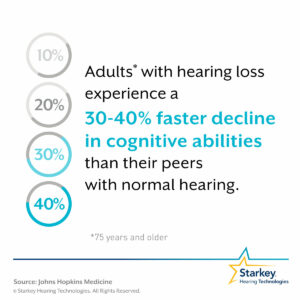Hearing Loss and Cognitive Decline: Why Hearing Loss Treatment Is Important

Hearing loss and cognitive decline are prevalent health issues among older adults, and recent research indicates a strong connection between the two conditions. Let’s explore the relationship between hearing loss and cognitive decline, emphasizing the importance of timely treatment for hearing loss to mitigate the risk of cognitive decline. Additionally, we discuss the benefits of addressing hearing loss and its positive impact on overall well-being and cognitive health.
Understanding Cognitive Decline
Cognitive decline, characterized by a gradual decrease in cognitive function, is a complex phenomenon that affects various aspects of an individual’s mental abilities. As people age, it is normal to experience some decline in memory, thinking, and language skills. However, certain medical conditions can accelerate cognitive decline, leading to more severe conditions such as dementia.
Dementia is a broad term encompassing a range of conditions characterized by a decline in cognitive abilities that impairs daily functioning. Alzheimer’s disease, the most common form of dementia, accounts for many cases. It is characterized by the accumulation of beta-amyloid plaques and tau tangles in the brain, leading to the progressive degeneration of brain cells.
The impact of cognitive decline extends beyond the individual affected. Family members and caregivers often face significant challenges in providing support and managing the changing needs of their loved ones. Emotional, physical, and financial burdens can require significant adjustments to daily routines and lifestyles. Communities and healthcare systems must adapt to meet the growing demand for specialized care and support services.

The Connection Between Hearing Loss and Cognitive Decline
Untreated hearing loss has been strongly associated with an increased risk of cognitive decline. When individuals experience hearing difficulties and do not seek appropriate treatment, several factors contribute to the heightened risk.
- Social Isolation: Hearing difficulties can lead to social isolation and are linked to cognitive decline. When individuals struggle to communicate effectively due to hearing loss, they may withdraw from social interactions, limiting cognitive stimulation and engagement.
- Auditory System and Cognitive Processes: The auditory system plays a crucial role in cognitive processes such as auditory processing, memory formation, and attention. Untreated hearing loss can disrupt these processes, affecting the brain’s ability to receive and process auditory information effectively.
- Cognitive Load: Hearing loss places an additional cognitive load on the brain. Constantly straining to understand speech and decipher sounds can tax cognitive resources, leaving fewer available for other cognitive functions. This increased cognitive load can accelerate cognitive decline, particularly in older adults.
- Common Health Problems: Hearing loss and cognitive decline are prevalent health problems among older adults. Although traditionally seen as separate conditions, emerging research suggests a connection between the two. Understanding and addressing this connection is crucial for maintaining cognitive health as individuals age.
These additional cognitive burdens accelerate cognitive decline, particularly in older adults. While there is no cure for hearing loss, various treatment options are available to manage and improve hearing abilities. Seeking appropriate interventions, such as hearing aids or other assistive devices, can have significant benefits beyond communication enhancement.

The Positive Impact of Treating Hearing Loss on Cognitive Health
Not only does treating hearing loss improve auditory perception, but it also offers several benefits for cognitive health. These benefits include:
- Enhanced Communication and Social Engagement: Treating hearing loss enables individuals to regain effective communication skills, fostering social engagement and reducing the risk of cognitive decline. Improved conversations, active participation in social activities, and maintaining relationships stimulate cognitive processes, promoting brain health.
- Reduced Cognitive Load: Effective treatment methods, including hearing aids, alleviate the cognitive strain caused by the constant effort to decipher sounds. By providing precise auditory signals, hearing aids significantly reduce the cognitive load associated with hearing loss. So the brain can allocate resources to other cognitive functions.
- Maintenance of Brain Plasticity: Studies suggest that treating hearing loss helps preserve brain plasticity—the brain’s ability to adapt and form new connections. Auditory stimulation through hearing aids maintains neural pathways associated with auditory processing, supporting cognitive function and slowing cognitive decline.
- Improved Mood: Treating hearing loss and improving hearing abilities can lead to a more positive mood. Better communication and participation in enjoyable activities contribute to an enhanced emotional state, protecting the brain from cognitive decline.
- Reduced Risk of Depression: By addressing hearing loss, individuals are less likely to develop depression. Communicating effectively and engaging in activities they enjoy reduces the risk of depressive symptoms. Since depression is a risk factor for cognitive decline, treating hearing loss can have a protective effect.
- Increased Self-Confidence: Treating hearing loss enhances self-confidence by enabling better communication and participation in enjoyable activities. Increased self-confidence contributes to the protection of the brain from cognitive decline.
Addressing Hearing Loss
So hearing loss treatment goes beyond improving auditory perception and holds significant benefits for cognitive health. By regaining practical communication skills, individuals can actively engage in conversations and social activities, stimulating cognitive processes and promoting brain health. The use of appropriate treatment methods, such as hearing aids, alleviates the cognitive strain associated with hearing loss, allowing the brain to allocate its resources to other cognitive functions. Moreover, treating hearing loss helps maintain brain plasticity by providing auditory stimulation, supporting cognitive function, and slowing cognitive decline. Ultimately, addressing hearing loss enhances self-confidence, further safeguarding the brain from cognitive decline. By recognizing and addressing hearing loss, individuals can optimize their cognitive health and enjoy a better quality of life.

How Can You Get Hearing Loss Treatment?
At Stanford Hearing Aids, we understand the importance of maintaining cognitive health and the significant role that hearing plays in this process. That’s why we offer free hearing evaluations to help prevent cognitive decline and improve overall well-being.
Our comprehensive hearing evaluations are conducted by experienced professionals who assess hearing loss and its impact on cognitive function. These evaluations provide valuable insights into your hearing abilities, identifying potential hearing loss and its effects on your cognitive health. By understanding your unique hearing profile, we can develop personalized treatment plans tailored to your specific needs.
Preventing cognitive decline starts with early detection and appropriate intervention. Our free hearing evaluations allow us to detect any hearing loss that may be contributing to cognitive decline. By addressing hearing loss promptly, we can help reduce the cognitive load on your brain, preserving cognitive resources for other vital functions.
Our team of hearing professionals will guide you through the evaluation process, explaining the results and discussing the available hearing loss treatment options. We offer a range of advanced hearing aids and assistive devices designed to improve auditory perception and enhance cognitive function. Our state-of-the-art technology focuses on clarity, precision, and comfort, ensuring optimal hearing experiences.Don’t let untreated hearing loss put your cognitive health at risk. Take advantage of our free hearing evaluation at Stanford Hearing Aids to proactively address hearing issues and potentially prevent cognitive decline. Schedule your evaluation today by contacting our friendly team. Together, we can protect your hearing health, promote cognitive well-being, and improve your overall quality of life.
